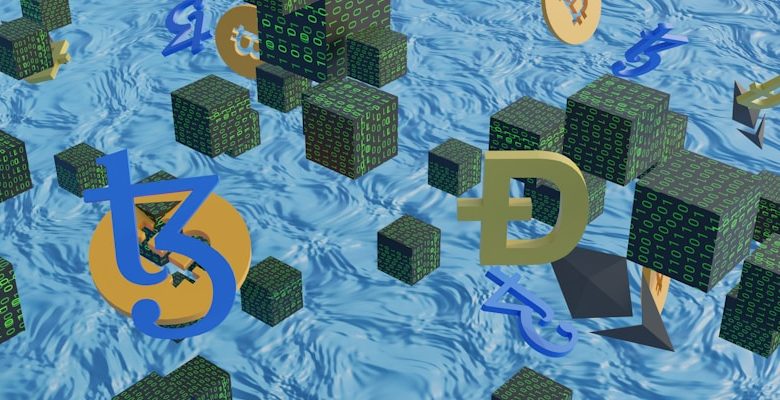The Rise of Decentralized Finance: Transforming Traditional Banking

- Understanding the Basics of Decentralized Finance
- The Advantages of Decentralized Finance over Traditional Banking
- Challenges and Opportunities in the Decentralized Finance Space
- Exploring Decentralized Lending and Borrowing Platforms
- The Role of Blockchain Technology in Decentralized Finance
- Regulatory Considerations for Decentralized Finance Innovations
Understanding the Basics of Decentralized Finance
Decentralized finance, also known as DeFi, is a rapidly growing sector in the financial industry that aims to transform traditional banking systems. Understanding the basics of decentralized finance is crucial for anyone looking to explore this innovative and disruptive technology.
DeFi operates on blockchain networks, such as Ethereum, that enable peer-to-peer transactions without the need for intermediaries like banks or financial institutions. This decentralized nature of DeFi allows for greater financial inclusion, lower fees, and increased transparency compared to traditional banking systems.
One of the key components of DeFi is smart contracts, which are self-executing contracts with the terms of the agreement between buyer and seller directly written into lines of code. Smart contracts automate transactions and eliminate the need for a trusted third party, making them a cornerstone of DeFi applications.
Another important aspect of DeFi is liquidity pools, which are pools of tokens locked in a smart contract that provide liquidity for decentralized exchanges. Users can contribute their tokens to these pools and earn fees in return, creating a decentralized and efficient way to facilitate trading.
Overall, decentralized finance offers a new paradigm for banking that is open, accessible, and transparent. By understanding the basics of DeFi, individuals can take advantage of this transformative technology to access a wide range of financial services in a decentralized and secure manner.
The Advantages of Decentralized Finance over Traditional Banking
Decentralized finance (DeFi) offers numerous advantages over traditional banking, making it a popular choice for many individuals looking to manage their finances in a more efficient and transparent manner.
- One of the key benefits of DeFi is its accessibility. Unlike traditional banking, which often requires individuals to meet certain criteria or provide extensive documentation, DeFi platforms are open to anyone with an internet connection.
- Another advantage of DeFi is its transparency. Transactions on DeFi platforms are recorded on a public blockchain, making it easy for users to track their funds and verify the integrity of the system.
- DeFi also offers greater control and autonomy over one’s finances. With DeFi, individuals can access a wide range of financial services without relying on a central authority, allowing them to make decisions that align with their own financial goals.
- Furthermore, DeFi often provides better interest rates and lower fees compared to traditional banking. Since DeFi platforms operate on a peer-to-peer basis, they can offer more competitive rates to users.
- Lastly, DeFi is often more secure than traditional banking. By leveraging blockchain technology, DeFi platforms can prevent fraud and hacking attempts, providing users with peace of mind when managing their finances online.
Challenges and Opportunities in the Decentralized Finance Space
One of the main challenges in the decentralized finance space is the lack of regulation. As the industry continues to grow rapidly, regulators are struggling to keep up with the pace of innovation. This creates uncertainty for both investors and developers, as they are unsure about the legal implications of their actions.
However, this lack of regulation also presents opportunities for decentralized finance to thrive. Without the constraints of traditional banking systems, developers have the freedom to experiment and create innovative solutions to financial problems. This has led to the rise of decentralized applications (dApps) that offer new ways to borrow, lend, and trade assets.
Another challenge in decentralized finance is the issue of security. With no central authority to oversee transactions, users are at risk of falling victim to hacking and fraud. This has led to the development of new security protocols and practices to protect users’ funds and data.
Despite these challenges, decentralized finance offers numerous opportunities for both individuals and businesses. By cutting out intermediaries, decentralized finance allows for faster and cheaper transactions. It also opens up access to financial services for people who are underserved by traditional banking systems.
Exploring Decentralized Lending and Borrowing Platforms
Decentralized lending and borrowing platforms have emerged as a key component of the decentralized finance (DeFi) ecosystem, offering users the ability to access financial services without traditional intermediaries. These platforms leverage blockchain technology to facilitate peer-to-peer lending and borrowing, allowing individuals to interact directly with one another in a trustless manner.
One of the main advantages of decentralized lending and borrowing platforms is their ability to offer lower fees compared to traditional financial institutions. By cutting out middlemen, users can benefit from reduced costs when accessing credit or lending out their assets. Additionally, these platforms typically operate 24/7, providing users with greater flexibility and accessibility to financial services.
Moreover, decentralized lending and borrowing platforms often offer a wider range of assets that users can use as collateral or borrow against. This opens up opportunities for individuals to access liquidity without having to sell their assets, enabling them to maintain their investment positions while leveraging their holdings.
Another key feature of decentralized lending and borrowing platforms is the use of smart contracts to automate the lending and borrowing process. Smart contracts are self-executing contracts with the terms of the agreement directly written into code. This eliminates the need for intermediaries and reduces the risk of human error or fraud.
Overall, decentralized lending and borrowing platforms are revolutionizing the way individuals access and interact with financial services. By providing a more efficient, cost-effective, and accessible alternative to traditional banking, these platforms are democratizing finance and empowering users to take control of their financial future.
The Role of Blockchain Technology in Decentralized Finance
Blockchain technology plays a pivotal role in the realm of decentralized finance (DeFi). By utilizing a decentralized ledger system, blockchain enables peer-to-peer transactions without the need for intermediaries such as banks or financial institutions. This not only streamlines the process but also reduces costs associated with traditional banking services.
One of the key advantages of blockchain in DeFi is its transparency. Transactions conducted on the blockchain are recorded on a public ledger, providing full visibility into the flow of funds. This transparency helps to build trust among users and eliminates the need for third-party verification, ultimately increasing efficiency in the financial ecosystem.
Moreover, blockchain technology enhances security in DeFi by utilizing cryptographic techniques to secure transactions and data. The decentralized nature of blockchain makes it resistant to hacking and fraud, ensuring that funds remain safe and secure. This increased security is a major draw for individuals looking to participate in DeFi without having to worry about the safety of their assets.
Another benefit of blockchain in DeFi is its ability to facilitate smart contracts. These self-executing contracts are written in code and automatically enforce the terms of an agreement when predetermined conditions are met. Smart contracts eliminate the need for intermediaries, reduce the risk of human error, and ensure that agreements are executed in a timely manner.
Overall, blockchain technology is revolutionizing the world of decentralized finance by providing a secure, transparent, and efficient platform for peer-to-peer transactions. As the adoption of DeFi continues to grow, blockchain will play an increasingly important role in transforming traditional banking and financial services.
Regulatory Considerations for Decentralized Finance Innovations
As Decentralized Finance (DeFi) continues to gain popularity and transform the traditional banking sector, regulatory considerations are becoming increasingly important. Regulators around the world are closely monitoring the growth of DeFi platforms to ensure compliance with existing financial laws and regulations.
One of the key challenges facing regulators is the decentralized nature of DeFi, which makes it difficult to apply traditional regulatory frameworks. Many DeFi platforms operate without intermediaries, such as banks or financial institutions, which raises questions about how to hold them accountable and ensure consumer protection.
Regulators are also concerned about the potential risks associated with DeFi, such as money laundering, fraud, and market manipulation. As a result, they are exploring ways to address these risks while still allowing for innovation in the sector.
Some regulators have taken a proactive approach to DeFi, working with industry stakeholders to develop guidelines and best practices. Others have taken a more cautious stance, issuing warnings about the potential risks of investing in DeFi platforms.
Overall, the regulatory landscape for DeFi is still evolving, and it is important for both regulators and industry participants to work together to find a balance between innovation and consumer protection. By addressing regulatory considerations proactively, the DeFi sector can continue to grow and thrive in a responsible manner.



